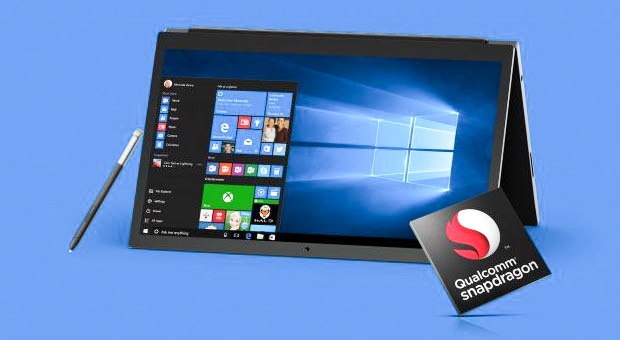Yesterday, at the Computex 2017 expo in Taipei, Taiwan, Qualcomm Technologies, subsidiary of Qualcomm Incorporated, announced that three major OEMs – Lenovo, HP and ASUS – will be the first to build “mobile PCs” that are powered by the Snapdragon 835, which features the company’s X16 LTE cellular modem.
These devices will run Windows 10, which means Microsoft is heavily invested in this announcement. But will it be the full version of Windows 10 that Microsoft and Qualcomm have planned for their “cellular PC” concept that’s coming out in the fourth quarter of 2017? Unfortunately, Qualcomm’s EVP Cristiano Amon, was a little ambiguous on that, only saying:
“With compatibility for the Windows 10 ecosystem, the Snapdragon Mobile PC Platform will enable Windows 10 hardware makers to develop next-generation modern device form factors and deliver unparalleled anything, anywhere creation experiences with up to Gigabit Class LTE connectivity.”
We’re not certain what “Windows 10 ecosystem” means, though it could indicate the full version rather than the mobile version, Windows 10 Mobile, since these new devices are technically full-fledged PCs running on mobile SoC architecture.
From the press release, all we’re able to glean is that these are going to be mobile devices, which could be tablets or convertibles. It’s not clear if there are any models that are going to be smartphone or phablet-sized, like what we’re expecting with Microsoft’s Cellular PCs, but the company did say that the new PCs would support all Windows applications, including Microsoft Office.
So, should Intel feel threatened by Qualcomm’s ingress into the PC space? Not necessarily, and certainly not immediately. Intel does have a significant presence in the cellular modem space with its XMM series of cellular modems that you’ll find in iPhone 7, and once the next iPhone launches, we could see the Intel XMM 7560 modem featuring in those, in addition to Qualcomm’s X16 cellular modems.
But the significance of Qualcomm’s announcement will, no doubt, send a shiver up Intel’s spine. The world is undeniably moving towards increased mobility, and this is where Qualcomm excels. Intel’s Atom processors for smartphones were nowhere near as popular – at least with OEMs – as Qualcomm’s Snapdragon series are.
With Snapdragon now edging into the PC space, Intel better make sure they have a plan in place to prevent this movement from shaking their position in the PC world.
Thanks for visiting! Would you do us a favor? If you think it’s worth a few seconds, please like our Facebook page and follow us on Twitter. It would mean a lot to us. Thank you.
Source: Qualcomm Press Release



